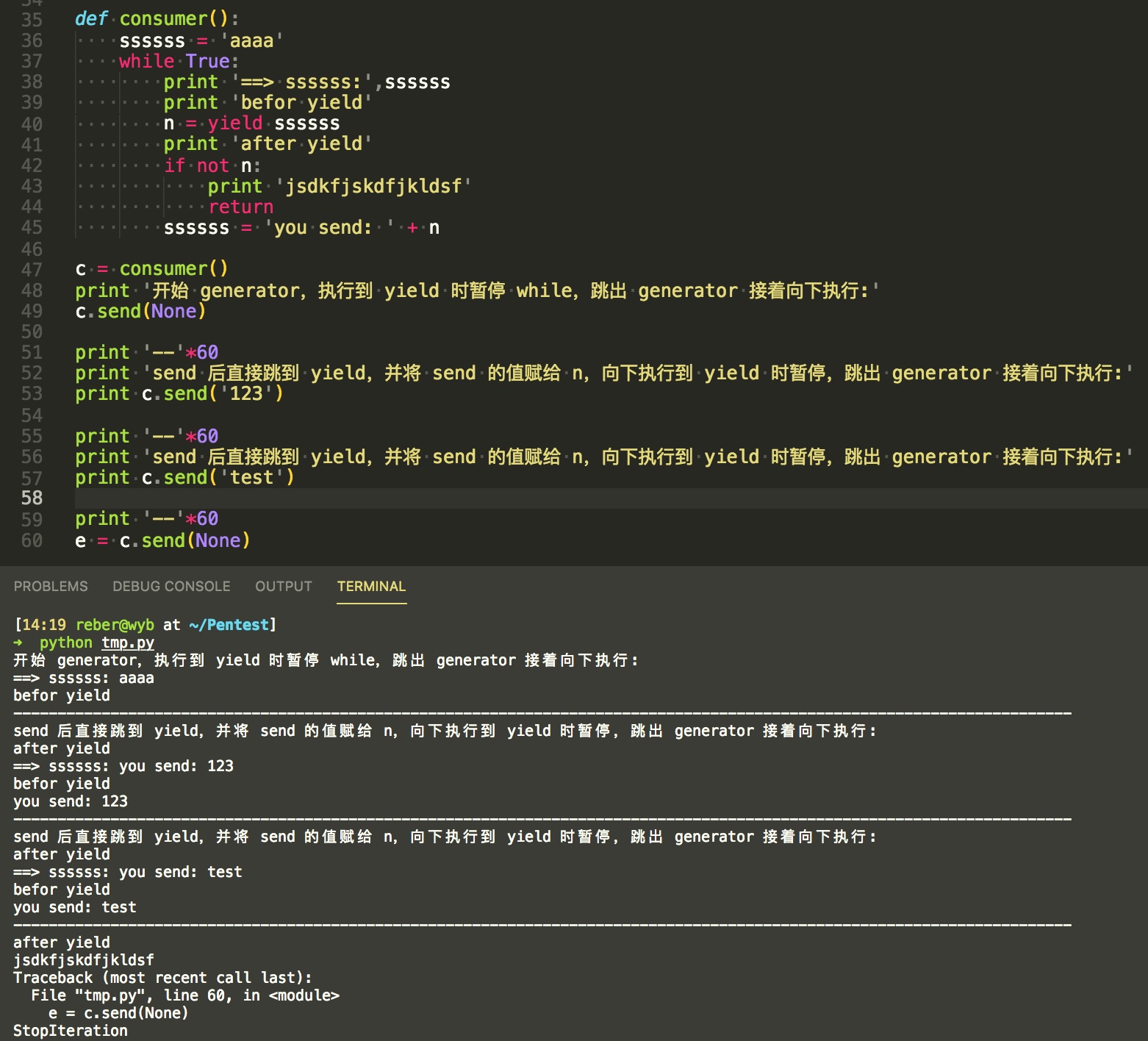利用 Python 的协程进行快速端口扫描
0x00 协程的优势
协程拥有极高的执行效率,因为子程序切换不是线程切换,而是由程序自身控制,因此没有线程切换的开销。和多线程比,线程数量越多,协程的性能优势就越明显。
不需要多线程的锁机制,因为只有一个线程,也不存在同时写变量冲突,在协程中控制共享资源不加锁,只需要判断状态就好了,所以执行效率比多线程高很多
0x01 Python中的协程
协程也就是微线程,python 的 generator(生成器) 中的 yield 可以一定程度上实现协程
在 generator 中,我们不但可以通过 for 循环来迭代,还可以不断调用 next() 函数获取由 yield 语句返回的下一个值。
但是 Python 的 yield 不但可以返回一个值,它还可以接收调用者发出的参数。

0x02 使用 gevent
python 中可以通过 generator 实现协程,但是不完全,第三方的 gevent 为 Python 提供了比较完善的协程支持,gevent 可以通过 monkey patch 动态的修改 Python 自带的一些标准库
由于 IO 操作(比如访问网络)非常耗时,经常使程序处于等待状态,而 gevent 可以为我们自动切换协程,再在适当的时候切换回来继续执行,这就保证总有 greenlet 在运行,而不是等待 IO
使用 gevent 可以获得极高的并发性能,但 gevent 只能在 Unix/Linux 下运行,在 Windows 下不保证正常安装和运行 下面 3 个网络操作是并发执行的,且结束顺序不同,但只有一个线程
from gevent import monkey; monkey.patch_all()
import requests
import gevent
def get_resp_size(url):
print('GET: %s' % url)
html = requests.get(url).content
print('%d bytes received from %s.' % (len(html), url))
def gevent_test(urls):
job_list = [gevent.spawn(get_resp_size, url) for url in urls]
gevent.joinall(job_list)
urls = [
'https://www.python.org/',
'https://www.yahoo.com/',
'https://github.com/',
]
gevent_test(urls)
0x03 asyncio
在 python 3.4 时引入了 asyncio 这个模块,asyncio 专门被用来实现异步IO操作。
通过使用
对于简单的迭代器,yield from iterable 本质上等于 for item in iterable: yield item 的缩写版
- hello world 示例
@asyncio.coroutine
def hello():
print("Hello world!")
r = yield from asyncio.sleep(1)
print("Hello again!")
- 请求web网页
import asyncio
@asyncio.coroutine
def wget(host):
print('wget %s...' % host)
connect = asyncio.open_connection(host, 80)
reader, writer = yield from connect
header = 'GET / HTTP/1.0\r\nHost: %s\r\n\r\n' % host
writer.write(header.encode('utf-8'))
yield from writer.drain()
while True:
line = yield from reader.readline()
if line == b'\r\n':
break
print('%s header > %s' % (host, line.decode('utf-8').rstrip()))
# Ignore the body, close the socket
writer.close()
loop = asyncio.get_event_loop()
tasks = [wget(host) for host in ['www.sina.com.cn', 'www.sohu.com', 'www.163.com']]
loop.run_until_complete(asyncio.wait(tasks))
loop.close()
0x04 async/await
在 python 3.5 时引入了 async/await
-
关于asyncio的一些关键字的说明
- event_loop
事件循环:程序开启一个无限循环,把一些函数注册到事件循环上,当满足事件发生的时候,调用相应的协程函数 - coroutine
协程对象,指一个使用async关键字定义的函数,它的调用不会立即执行函数,而是会返回一个协程对象。协程对象需要注册到事件循环,由事件循环调用。 - task
一个协程对象就是一个原生可以挂起的函数,任务则是对协程进一步封装,其中包含了任务的各种状态 - future
代表将来执行或没有执行的任务的结果。它和task没有本质上的区别 - async/await
async定义一个协程,await就像生成器里的yield一样用于挂起阻塞的异步调用接口。
- event_loop
-
async和await是针对coroutine的新语法,要使用新的语法,只需要做两步简单的替换:
- 把@asyncio.coroutine替换为async;
- 把yield from替换为await。
-
hello world 示例
@asyncio.coroutine
def hello():
print("Hello world!")
r = yield from asyncio.sleep(1)
print("Hello again!")
# 改为如下代码:
async def hello():
print("Hello world!")
r = await asyncio.sleep(1)
print("Hello again!")
- 使用asyncio创建任务运行,并给task指定callback得到执行结果
import asyncio
async def do_some_work(x):
print("waiting:", x)
return "Done after {}s".format(x)
def callback(future):
result = future.result()
print('callback:',result)
def run1():
loop = asyncio.get_event_loop() # 定义一个事件loop
coroutine = do_some_work(2) # 定义协程对象,它不能直接运行
# run_unitl_complete() 需要传入一个 Future 对象
# 若传入协程的话 run_unitl_complete 内部会将协程包装成一个任务(task)对象
# task 对象是 Future 类的子类,保存了协程运行后的状态,用于未来获取协程的结果
result = loop.run_until_complete(coroutine)
print(result)
loop.close()
def run2():
loop = asyncio.get_event_loop() # 定义一个事件loop
coroutine = do_some_work(1) # 定义协程对象,它不能直接运行
task = loop.create_task(coroutine) # 创建协程 task
# task = asyncio.ensure_future(coroutine) # 也可以使用 ensure_future() 直接创建 Future 对象
task.add_done_callback(callback) # 回调函数,获取task的返回值
loop.run_until_complete(task) # 将task加入到事件循环 loop
loop.close()
- 使用 asyncio 并发执行协程
异步和并发与并行并没有关系,异步用于表示并发或并行任务的印象
import asyncio
async def do_some_work(x):
print("waiting:", x)
await asyncio.sleep(x)
return "Done after {}s".format(x)
def callback(future):
print('callback',future.result())
def run1():
# 4s 后结果同时返回
tasks = [asyncio.ensure_future(do_some_work(x)) for x in [2, 1, 4]]
loop = asyncio.get_event_loop()
loop.run_until_complete(asyncio.wait(tasks))
for task in tasks:
result = task.result()
print(result)
loop.close()
def run2():
# 1s、2s、4s 分别返回结果
tasks = [asyncio.ensure_future(do_some_work(x)) for x in [2,1,4]]
for task in tasks:
task.add_done_callback(callback)
loop = asyncio.get_event_loop()
# wait 返回完成的和未完成的任务
done, pending = loop.run_until_complete(asyncio.wait(tasks))
# results = loop.run_until_complete(asyncio.gather(*tasks))
loop.close()
- 停止协程
import asyncio
async def do_some_work(x):
print("waiting:", x)
await asyncio.sleep(x)
return "Done after {}s".format(x)
def callback(future):
print('callback',future.result())
def run():
# 1s、2s、4s 分别返回结果
tasks = [asyncio.ensure_future(do_some_work(x)) for x in [2,1,4]]
for task in tasks:
task.add_done_callback(callback)
loop = asyncio.get_event_loop()
try:
loop.run_until_complete(asyncio.wait(tasks))
except KeyboardInterrupt as e:
for task in asyncio.Task.all_tasks():
print(task.cancel())
loop.stop()
# loop stop 之后还需要再次开启事件循环,最后再 close,不然还会抛出异常
loop.run_forever()
finally:
loop.close()
0x05 协程与线程配合使用
import asyncio
import threading
async def do_some_work(x):
print("waiting:", x)
await asyncio.sleep(x)
return "Done after {}s".format(x)
def callback(future):
print('callback',future.result())
def start_loop(loop):
asyncio.set_event_loop(loop)
loop.run_forever() # 和 run_until_complete 作用一样,不过这个在协程运行完后不会停止
def run():
# 在子线程中运行协程loop
sub_loop = asyncio.new_event_loop()
thread = threading.Thread(target=start_loop, args=(sub_loop,))
thread.start()
# 在主线程给子线程的 loop 添加协程任务
futures = [asyncio.run_coroutine_threadsafe(do_some_work(x), sub_loop) for x in [2,1,4]]
for future in futures:
future.add_done_callback(callback)
print('test...')
try:
while True:pass
except KeyboardInterrupt as e:
import sys;sys.exit('user aborted!')
finally:
sub_loop.call_soon_threadsafe(sub_loop.stop)
run()
➜ python3 tmp.py
waiting: 2
test...
waiting: 1
waiting: 4
callback Done after 1s
callback Done after 2s
callback Done after 4s
^Cuser aborted!
0x06 通过协程实现全端口 tcp 快速扫描
import time
import asyncio
import threading
class PortScan(object):
"""docstring for PortScan"""
def __init__(self, ip_list=["127.0.0.1"], all_ports=False, rate=2000):
super(PortScan, self).__init__()
self.ip_list = ip_list
self.rate = rate
self.all_ports = all_ports
self.open_list = {}
self.common_port = "21,22,23,25,53,69,80,81,82,83,84,85,86,87,88,89,110,111,135,139,143,161,389,443,445,465,513,873,993,995,1080,1099,1158,1433,1521,1533,1863,2049,2100,2181,3128,3306,3307,3308,3389,3690,5000,5432,5900,6379,7001,8000,8001,8002,8003,8004,8005,8006,8007,8008,8009,8010,8011,8012,8013,8014,8015,8016,8017,8018,8019,8020,8021,8022,8023,8024,8025,8026,8027,8028,8029,8030,8031,8032,8033,8034,8035,8036,8037,8038,8039,8040,8041,8042,8043,8044,8045,8046,8047,8048,8049,8050,8051,8052,8053,8054,8055,8056,8057,8058,8059,8060,8061,8062,8063,8064,8065,8066,8067,8068,8069,8070,8071,8072,8073,8074,8075,8076,8077,8078,8079,8080,8081,8082,8083,8084,8085,8086,8087,8088,8089,8090,8888,9000,9080,9090,9200,9300,9418,11211,27017,27018,27019,50060"
async def async_port_check(self, semaphore, ip_port):
async with semaphore:
ip,port = ip_port
conn = asyncio.open_connection(ip, port)
try:
reader, writer = await asyncio.wait_for(conn, timeout=10)
return (ip, port, 'open')
except Exception as e:
# print(e)
return (ip, port, 'close')
def callback(self, future):
ip,port,status = future.result()
if status == "open":
print(ip,port,status)
try:
if ip in self.open_list:
self.open_list[ip].append(port)
else:
self.open_list[ip] = [port]
except Exception as e:
print(e)
else:
pass
def async_tcp_port_scan(self):
ports = [port for port in range(11,65535)] if self.all_ports else self.common_port.split(',')
ip_port_list = [(ip,int(port)) for ip in self.ip_list for port in ports]
sem = asyncio.Semaphore(self.rate) # 限制并发量
loop = asyncio.get_event_loop()
tasks = list()
for ip_port in ip_port_list:
task = asyncio.ensure_future(self.async_port_check(sem, ip_port))
task.add_done_callback(self.callback)
tasks.append(task)
loop.run_until_complete(asyncio.wait(tasks))
print(self.open_list)
if __name__ == '__main__':
ip_list = ["59.108.35.198"]
now = time.time
start = now()
ps = PortScan(ip_list,True,2000)
ps.async_tcp_port_scan()
print("Time:",now()-start)
➜ python3 tmp.py
59.108.35.198 22 open
59.108.35.198 80 open
59.108.35.198 8888 open
59.108.35.198 50050 open
{'59.108.35.198': [22, 80, 8888, 50050]}
Time: 49.96410322189331
